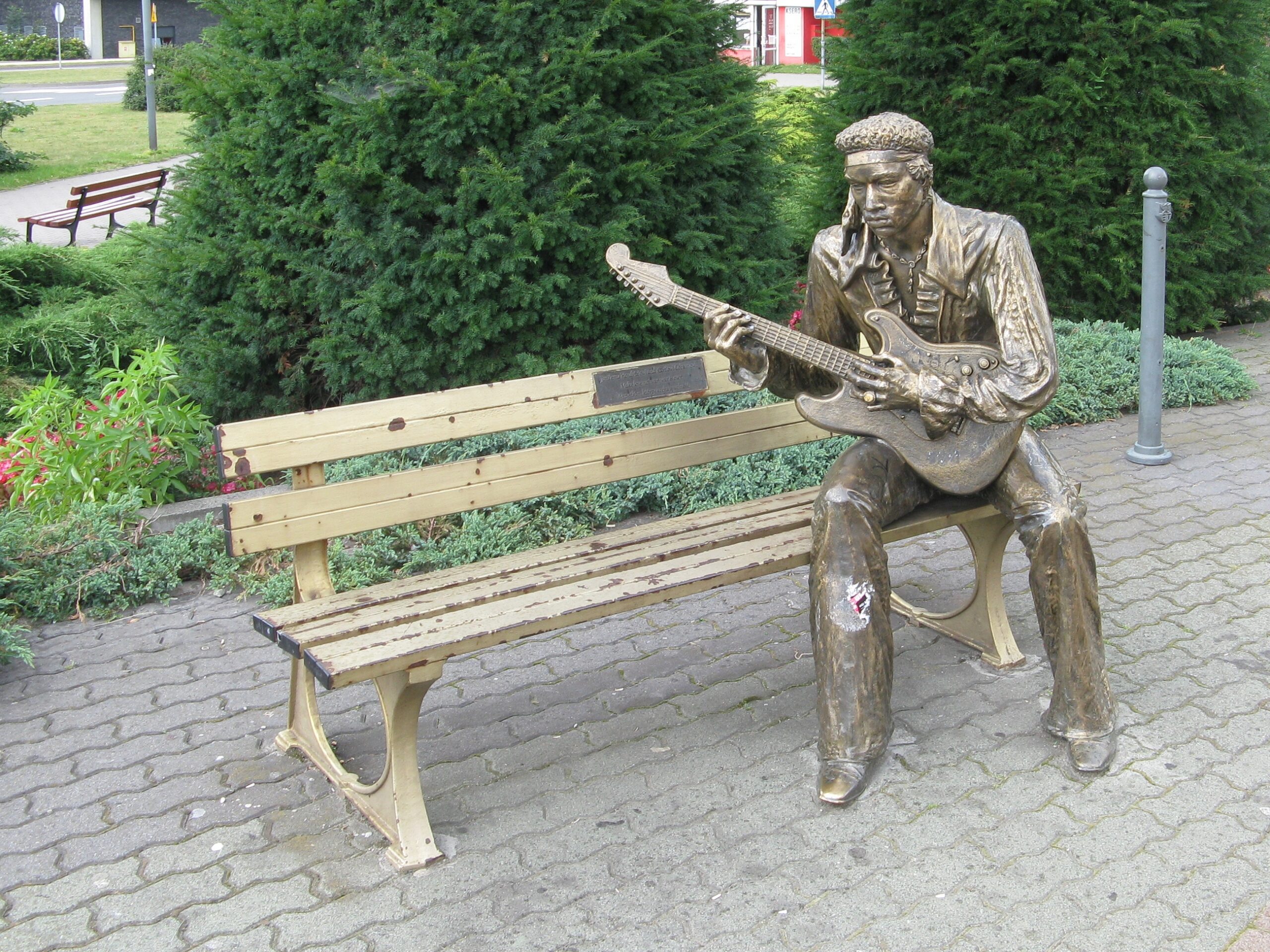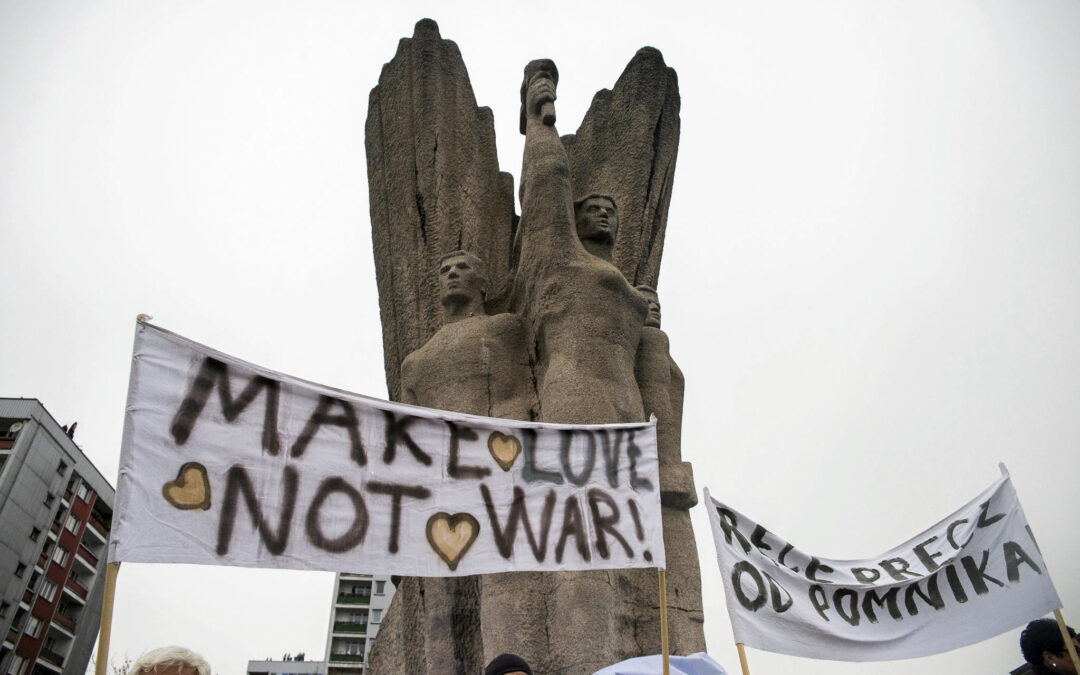Local residents in Dąbrowa Górnicza, an industrial city of 120,000 in Poland’s south, have won a final victory in a long-running battle to save a beloved but controversial communist-era monument.
Previously, they prevented its demolition by enlisting the posthumous help of Jimi Hendrix. Now, they have won a final ruling from Poland’s highest court of appeal, which rejected an attempt by a state body to remove the statue under a “de-communisation” law.
Dabrowa Gornicza Plac Wolnosci.Pomnik odnawiany za pieniadze panstwowe. pic.twitter.com/TlwgVTFvZc
— Wojcik Krzysztof (@WkWojcik) March 12, 2015
The monument in question was erected in 1970, when Poland was under communist rule, as a tribute, in typical socialist realist style, “To the Heroes of the Red Banner”.
Attempts to dismantle it began in the 1990s, after Poland shook off the yoke of communism and sought to clear public spaces of remnants of its past regime.
At that time, residents rallied to save the statue from detonation with explosives by renaming it as a monument to Hendrix and Kurt Cobain and standing guard next to it night and day. Its plaque was changed to read: “To Jimi Hendrix. To Kurt Cobain. Make love, not war. War is over. To all who love liberty.”
In 2006, the monument was cleaned and a new plaque installed, referring back to the original conception: “To the heroes of the red banners. To those of Dąbrowa. To the founders of the history of struggle for national and social liberation.”
Hendrix was not forgotten, however: a bronze statute of him sitting on a bench was unveiled nearby, with the former plaque from the monument mounted upon it.

Jimi Hendrix bench in Dąbrowa Górnicza, also dedicated to the memory of Kurt Cobain (Adrian Tync/Wikimedia Commons, under CC BY-SA 4.0)
But in 2018 – after Poland’s conservative government passed a law requiring the “decommunisation” of public spaces – the governor of the Silesia Province in which Dąbrowa Górnicza is located asked the Institute of National Remembrance (IPN), a government institution charged with documenting and researching Poland’s communist past, to issue an opinion on the monument.
The IPN found that the statue does indeed “symbolise communism”, and thus should be removed. It noted that the monument’s date of unveiling – 8 November 1970 – had been chosen to mark the anniversary of the 1917 Bolshevik Revolution in Russia.
Adam Siwek, director of the IPN’s Bureau for Commemorating Struggle and Martyrdom, called it “unacceptable” that, “on the 100th anniversary of our country regaining independence [in 1918], a monument dedicated to the communists should exist in the public space of a large Polish city,” reports local portal news portal NaszeMiasto.
The municipal authorities in Dąbrowa Górnicza, however, rejected the IPN’s interpretation. They argued that the monument commemorates regional events from 1905 and 1918, with no relation to any people, organisations or events associated with communist rule in Poland, which began after the Second World War.
“[The monument] is associated with the events of 1918, which led to the emergence of local authorities in the region, which supported the independence government appointed by [Polish chief of state] Józef Piłsudski,” the mayor’s office said last year, reports Gazeta.pl.
“I encourage the IPN to learn more about the history of our city,” said the mayor, Marcin Bazylak. “Maybe then it will be easier to understand what this monument has become for our community.”
“For many people, this is simply a monument to Hendrix, a well-known meeting place and one of the symbols of the city that blends in with its landscape,” Bazylak added.
Hundreds of residents from Dąbrowa Górnicza and neighbouring towns flocked to defend the monument, holding a demonstration beneath it with signs reading “Hands off the statue”, “Make love, not war” and “Our city, our home, our decision”.
Students from the local arts school painted over the rifle held by one of the carved figures, recasting it as a guitar, while another student painted “In memory of Jimi Hendrix” across the statue.
Stoi już pół wieku, więc wpisał się w krajobraz Dąbrowy Górniczej. Czy przetrwa dłużej, nie jest jednak pewne. IPN wnosi bowiem kasację, niezmiennie podkreślając, że pomnik "Bohaterom Czerwonych Sztandarów" to symbol komunizmuhttps://t.co/nsKiTJRFaQ
— Sosnowiec Wyborcza.pl (@WyborczaSosno) April 22, 2020
The IPN, however, claims to have found no archival evidence of the monument’s links to the events of 1905. It notes that communist propaganda often exploited such allusions to national events. The institute therefore upheld its decision.
That prompted the district authorities in Dąbrowa Górnicza to take the case to the provincial administrative court, which in January this year overturned the IPN’s decision.
The court found that the IPN’s justification had used “imprecise language” and did not present a convincing case. It also ruled that the institute had “not responded in a substantive manner” to the arguments presented by the local authorities.
The IPN appealed that decision in May, taking it to the Supreme Administrative Court (NSA) in Warsaw, Poland’s highest appeals court for administrative cases. Now, the NSA has rejected the IPN’s appeal and upheld the decision of the provincial court, reports Gazeta.pl. Its ruling is final.
“Nobody can order us to demolish the monument” now, celebrated Mayor Bazylak.
Opublikowany przez Miasto Dąbrowa Górnicza Poniedziałek, 14 września 2020
Main image credit: Kamila Kotusz / Agencja Gazeta

Maria Wilczek is deputy editor of Notes from Poland. She is a regular writer for The Times, The Economist and Al Jazeera English, and has also featured in Foreign Policy, Politico Europe, The Spectator and Gazeta Wyborcza.




















